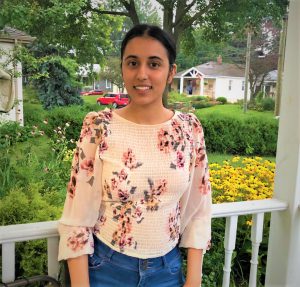The following interview has been lightly edited for length and clarity.
Meet the Interviewee: Japleen Thind

Japleen Thind is a second year student at McMaster University. She entered McMaster University as a Life Sciences student. At the end of her first year, she transferred into the Health Sciences program at the university. Her ultimate goal is to pursue a career in medicine.
What sparked your interest in the program?
“Since grade 10, the Health Sciences program at McMaster University had been my top choice for an undergraduate degree. Health Sciences at McMaster is known for being a pre-med program, though there is no such thing. Anyone who is passionate and willing to work hard could get accepted to medical school, the university and program that an undergraduate degree is completed from do not matter. However, many students from the Health Sciences program do get accepted to medical school. I think it is because of the transferrable skills that the program allows its students to develop. There are inquiry classes that have you work in groups and courses where your mark is determined heavily through interviews done with professors.
These are a few of the ways that the program allows you to become prepared for the interview component that is a part of the medical school admissions process. Due to this reputation of Health Sciences being good for a pre-med student, I wanted to attend it as a high school student. After the first year of university, I found more reasons to attend the program. I am quite an introvert, but group work is essential in pursuing medicine. Since Health Sciences involves quite a bit of group work, I decided to apply to the program again with the hope that if I get accepted, I would be in an environment that is out of my comfort zone. This would allow me to develop better communication and collaboration skills.”
What was your grade average upon applying to the program?
“I had an 11.5 GPA on the 12.0 scale that is used at McMaster University”
What did the supplementary application entail?
“There were three question prompts that were a part of the supplementary application. The questions change year to year and none of the questions has a right answer. From what I know of the program, they want to accept students based on their reasoning. Each question has a limit of 1,500 characters which includes punctuation and spaces, this amounts to approximately 230 words or so. This means that there is not a lot of space available to write everything you may want. So you have to be wise in what you choose to include in the supplementary application.
For instance, in my year, there was a question that asked us to write about a disease that intrigues you and discuss its pathological and physiological reasons. There are so many diseases and their possible causes, but choosing one that you can passionately talk about would make for a great answer. I talked about avarice, arms trade, diarrhoeal disease and the health care system in Africa in my answer. Another question asked about a role that is hard for you to complete when working in a group. This is where you could reflect on yourself, talk about your experience of working in a group and write an honest answer that allows them to visualize you as a person through your answer. The last question involved a bar graph and the occurrence of an illness in a population. You had to analyse the given phenomenon and graph in your answer. This is where critical thinking and clarity in your writing would help you write a thoughtful answer.”
Honestly, why do you think the program selected you? What do you think set you apart from other students who applied?
“The program selects students on two bases: GPA and supplementary application. I believe that the GPA I got is attainable in university and I am sure many applicants had the same or even higher GPA. The supplementary is likely what got me into the program. I did not miss out on including examples in my answers and thought of the most unique answer that I could think of. My approach was to try to think of the most common answer to the questions and then scratch those ideas out. I knew that the easiest answer that I thought of or researched is likely the most common answer. So I avoided those answers and tried to find answers that were different. I did well in English class throughout high school as well. Though I was not the best at English and it’s my second language, the English program at my school did involve creative writing and critical thinking. This experience was useful in writing my supplementary application.”
If you could go back in time, knowing what you know now, what would you tell your former self upon preparing for the application?
“I wish I could tell myself applying in high school to focus less on writing the supplementary application and to instead focus more on planning my answers. When I applied at the end of first year, I wrote my answers and edited them in a few days, but I had been planning my answers for a couple of months. I did not write much in the planning process, I just read the question prompts and thought about possible answers. This is not to say that it takes months to write the supplementary application, it doesn’t take long at all. However, you should read the questions in advance and allow yourself enough time to create the most thoughtful answer that you can. During high school, I did the opposite. I planned my answers for a week or so and wrote the supplementary a few months in advance. This is not necessary and prevents you from brainstorming the most thoughtful and unique answer. Also, I would tell myself in high school to get involved in volunteering at the hospital more, finding research positions and getting involved in other such activities that would prepare me better for university. I knew I wanted to become a doctor since high school, so doing things that would merge me more into the field would have solidified my resume and made me better prepared for a career in medicine.”
Based on your experience in the program, would you recommend Grade 12 students to apply? If so, what advice would you give them upon applying?
“I have not yet attended the program, but from what I have experienced in university and as being a transfer student, the program has a lot to offer. I would recommend Grade 12 students to apply. The program involves the Problem Based Learning (PBL) method of teaching students. This means that students have to do a lot of critical thinking, teamwork and self-directed learning. These are transferrable skills and essential for any career.
At the same time, it is undeniable that the program is competitive. Whether you apply at the end of high school or first year, admission into the program is selective and the acceptance rate is low. If you do not get accepted, it is okay! There are so many different paths to medical school, Health Sciences is not the only option. The skills that you develop in Health Sciences could be developed in other ways as well.
Also, going into university, I think it’s important for students to recognize that their focus will change from high school. In university, you have to start thinking about building a career for yourself as opposed to focusing on getting into a specific university program. This means that a lot of self-regulation and planning is needed. Learn to find a balance between your social and work life. Especially as a pre-med, it will be rare for you to have no work at any moment, there will always be something on your plate. The best approach in university is to do what you like and understand that you can work at your own pace. Everyone has a different capacity of doing work, as long as you try your best, remain motivated and avoid exhaustion, you will be just fine.”
Is there a different process for students like yourself who are transferring into the program after the first year. If there is would you like to write another answer explaining the difference?
Regardless of whether you apply at the end of first year or at the end of high school, the process is similar. You need a good GPA/percentage and a good supplementary application. If you are applying in high school, you need a 90% or higher to be considered for the program and if you are applying after first year, you need a GPA of 10.0 on the 12.0 scale. To apply for the program while in high school, you apply through the Ontario Universities’ Application Centre (OUAC) and then you are informed through emails about how to submit the supplementary application. For transfer students, it depends on whether you went to McMaster University for your first year or a different university. If you went to McMaster University, you apply through Mosaic, and if you attended a different university, you apply through OUAC. The Health Sciences website has all the relevant information about the process, it would be the best source to check how to apply.

